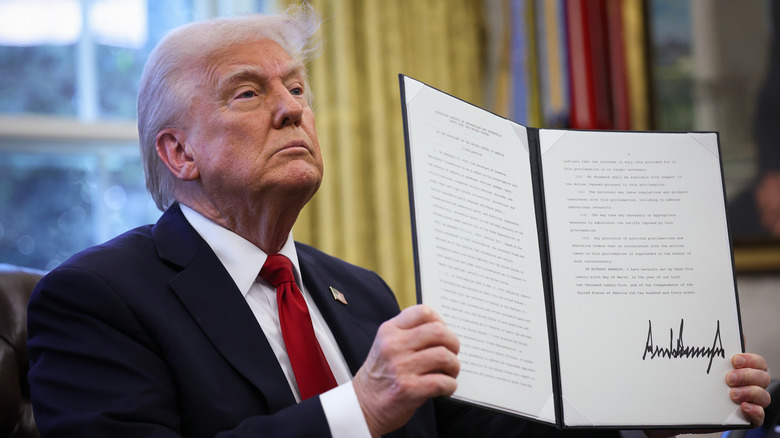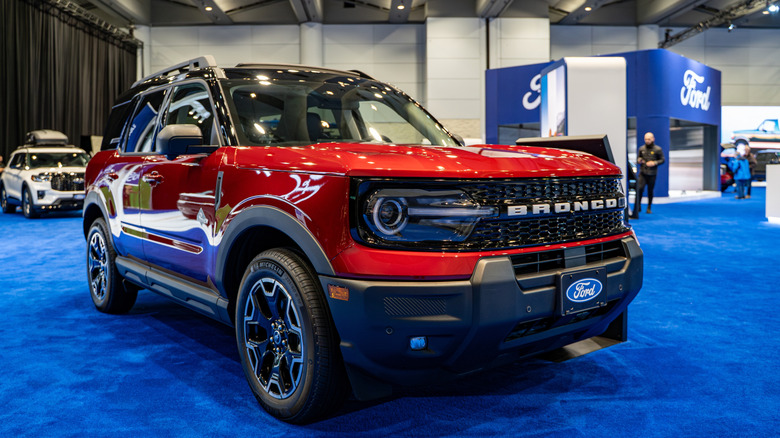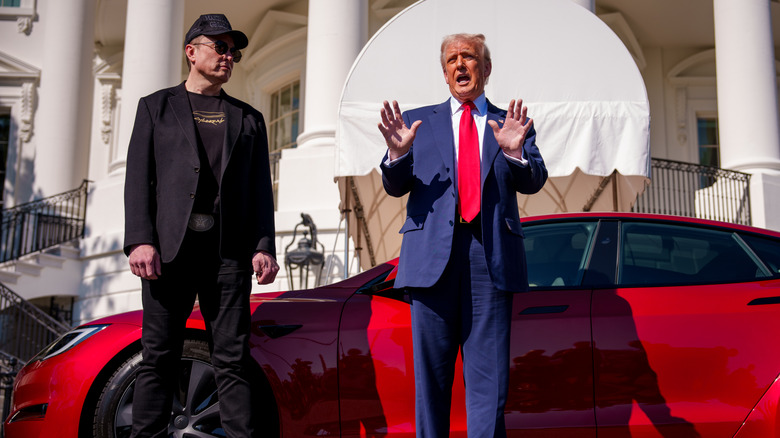New Trump Tariffs Will Make Some American Cars More Expensive: Which Ones & Why?
President Trump is at the wheel, so industry-upending tariffs are in town. Trump announced a new set of automotive tariffs the evening of March 26, 2025. Imported finished cars, light trucks, and key auto parts are under 25% tariffs. The duties for finished cars and trucks takes effect April 3, and the key car parts duty no later than May 3. Per a White House fact sheet, the purpose of stiff auto import duties is twofold: to protect national security by reducing reliance on import brands and the wider global supply chain, and to boost domestic automotive manufacturing.
While the prospect of stiff tariffs on foreign automotive imports has found an immediate fan in United Auto Workers president Shawn Fain, the same news sent United States automaker stocks tumbling after-hours, and further rocked global automotive trade partners in the midst of an ever-escalating set of trade wars. Retaliatory tariffs hang in the balance, as do automotive jobs, ratcheting geopolitical tensions, and potential pricing pain points here at home. The cost of tariffs are passed on to end customers, and can price certain automakers out of business altogether.
While the tariffs are being levied on foreign imports, the globally interdependent nature of the automotive industry means that the prices of many "American" cars will also be affected. Even cars that can largely count themselves "American-made" rely on foreign assembly or foreign auto parts assembled into American autos, and are therefore vulnerable to the tariffs.
Immediate pricing and availability impact
While Donald Trump's auto tariffs have a clear aim to push production into the U.S., domestic manufacturing centers will take years and investment fortunes to be realized. However, short-term price increases may happen seemingly overnight. The Big Three U.S. automakers (Ford, General Motors, and Stellantis) that assemble cars in foreign countries or import foreign components must contend with immediate industry changes — and so must their American consumers. For example, the Ford Bronco Sport and Mustang Mach-E are produced in Mexico, the Chrysler Pacifica assembled in Canada, and the Chevrolet Silverado 1500 from one of the three North American countries.
Still, while Trump's tariffs mean now is a bad time to buy a car, automakers have been stockpiling certain engines and key components in anticipation of those tariffs taking effect. For a very brief time, American-assembled cars using already-purchased (stockpiled) components may not undergo much of a pricing change. But when parts run out, production may shut down. "At best, we're probably looking at maybe a week's worth of supply of (parts) inventory," Stephanie Brinley, S&P Global Mobility analyst, said at an Automotive Press Association event on March 25 (via Axios), adding: "And as you know, if you're building a vehicle, it's going to be stopped on one part (shortage). And we don't know what that magic part is yet."
Different models of vehicles that don't require newly-pricey imported components and assembly could shift the production priorities at plants (as what happened during COVID-19 related shortages) and reduce certain product availability on lots, which could lead to spiked prices up thousands of dollars for some or all models of vehicles.
Potential long-term impact
Per analysis by the Michigan-based Anderson Economic Group, U.S. automotive production prices will rise anywhere from $3,500 to $12,000 per vehicle under Donald Trump's 25% automotive tariffs. Ripple effects from these new tariffs will likely create workflow shifts, product shortages, and job losses while prices rise and trade war tensions roil. Still, the Trump administration hopes to raise $100 billion in annual tax revenue via tariffs, as well as drive up domestic automotive manufacturing at home.
However, stability is key when it comes to big investment monies getting spent on automotive industry infrastructure. The outlook for such investment in the U.S. is also in the shapeshifting shadow of looming tariffs, including those on steel and aluminum, which could prove economically throttling in the long-term – perhaps with a quicker path to reality than the U.S. re-emerging as an automotive manufacturing center circa the 1950s.
Per the 2024 Cars.com American-Made Index, a report detailing how American-made cars are based on the amount of U.S. labor, components, and assembly is conducted on a vehicle, there is one U.S. automaker that takes the undeniably most American-made spot on that list: Tesla. Tesla stock is tanking while Tesla CEO and top Trump donor Elon Musk serves double duty as the de facto head of the Department of Government Efficiency, so much so that Tesla is no longer Musk's top asset. While punishing automotive tariffs might spike auto prices in the short term and lead to increased domestic production in the long-term, it's clear that Tesla is one U.S. automaker advantageously positioned for what will likely be a long, wild ride.


